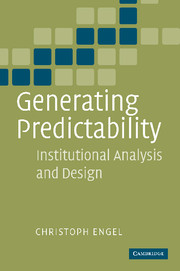Book contents
- Frontmatter
- Contents
- Preface
- Notation
- 1 Introduction
- 2 The psychological predictability problem
- 3 Rational choice responses
- 4 Behaviourally informed responses
- 5 Behaviourally determined responders
- 6 Outlook: implications for interaction with higher complexity
- 7 Predictability at the crossroads of competing institutionalisms
- Equations
- References
- Index
6 - Outlook: implications for interaction with higher complexity
Published online by Cambridge University Press: 22 September 2009
- Frontmatter
- Contents
- Preface
- Notation
- 1 Introduction
- 2 The psychological predictability problem
- 3 Rational choice responses
- 4 Behaviourally informed responses
- 5 Behaviourally determined responders
- 6 Outlook: implications for interaction with higher complexity
- 7 Predictability at the crossroads of competing institutionalisms
- Equations
- References
- Index
Summary
The reader who has been willing to read this far in the book will not have retained a view of low complexity. The rational choice part, despite the rigorous simplification of the model, had to rely on mathematics to handle the remaining degree of complexity. The more psychologically inspired chapters gave an account of the universe of findings that are relevant for assessing and containing the predictability risk. And still all this is extremely simplified. The whole book only looks at one class of situations: one informed actor and one uninformed actor have one single opportunity for co-operation. Alter knows everything he wants to about Ego. Only Ego is unable fully to predict Alter's future behaviour. Such situations exist often enough in life. A newly accepted member of a group who interacts with one of the regulars offers one possible example. If the regular follows most of the routine characteristics of the group, Alter may be able to predict Ego's behaviour reasonably well. But Ego may have a much harder time predicting Alter's behaviour. But many situations in life are different. Most of them are inherently more complex.
The predictability problem in situations of higher complexity can in principle also be analysed based on the findings and the structure of this book. This chapter aims to illustrate this potential. But it does so with broad-brush sketches only. There are two reasons for this moderate approach. One is subjective. The book would otherwise have grown out of all proportion.
- Type
- Chapter
- Information
- Generating PredictabilityInstitutional Analysis and Design, pp. 253 - 262Publisher: Cambridge University PressPrint publication year: 2005



